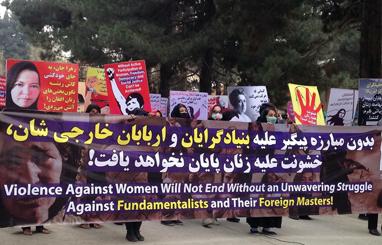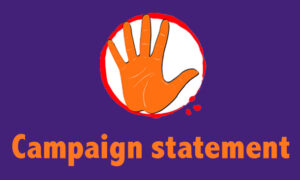Statement on Campaign to Stop “Honor” Killings on the occasion of March 8, International Women’s Day
We commemorate the historic significance of this day, rooted in the collective struggle of women worldwide for their human rights. It was in 1910, at the World Women’s Conference in Copenhagen, where one hundred women from seventeen countries proposed March 8 as International Women’s Day, aiming to unite women globally in their pursuit of equality. After decades of relentless advocacy by women’s rights activists, the United Nations General Assembly officially recognized March 8 as International Women’s Day in 1977. Since then, this day has served as a symbol of solidarity and empathy among women worldwide, reflecting their unwavering commitment to eradicate all forms of gender oppression until achieving true equality.
Throughout the years, Iranian women’s rights activists have steadfastly observed International Women’s Day, despite facing numerous challenges and restrictions. Particularly within the 45-year history of the Islamic Republic, Iranian women have courageously confronted sexual and gender oppression, standing at the forefront of movements for social change.
Over a century ago, Iranian women activists initiated efforts against reactionary forces by establishing girls’ schools, publishing magazines, forming associations, and advocating for the right to participate in governance. The revolution of 1979 marked a pivotal moment when Iranian women boldly opposed gender-based apartheid and the mandatory hijab. On March 8, 1357 (equivalent to March 17, 1979), women led numerous demonstrations across Tehran and other cities, vehemently protesting against mandatory hijab with the powerful slogan, “We didn’t make a revolution to go back.” Since then, they have continued their resistance against oppressive regimes, tirelessly advocating for the right to choose and resisting the compulsory hijab, often at great personal risk.
In solidarity with other social, student, labor, and cultural movements, the Iranian women’s movement has championed various causes, including combating poverty, inequality, national oppression, and environmental degradation. They have challenged discriminatory laws, campaigned against stoning, honor killings, and child marriages, and tirelessly fought to halt executions.
The revolutionary movement of women, life, freedom, ignited by the tragic murder of Gina Mahsa Amini, symbolizes the culmination of over fourteen decades of women’s brave resistance against misogyny, oppression, and torture. This movement has garnered international admiration and acclaim. Another significant achievement of the Iranian women’s movement is the Nobel Peace Prize awarded to Narges Mohammadi, a staunch advocate for Iranian women’s rights, even while imprisoned.
As we mark International Women’s Day 2024, the United Nations emphasizes the importance of “encouraging participation” and prioritizes efforts to accelerate gender equality and empower all women and girls. The campaign to stop “honor” killings aligns with this objective, striving alongside women worldwide to create a world free from prejudice, gender stereotypes, and discrimination—a world that celebrates diversity, fairness, and inclusivity.
We call upon all allies and advocates to break their silence against misogyny. As we celebrate International Women’s Day on March 8, 2024, the campaign to stop “honor” killings reaffirms that women’s rights are human rights.























